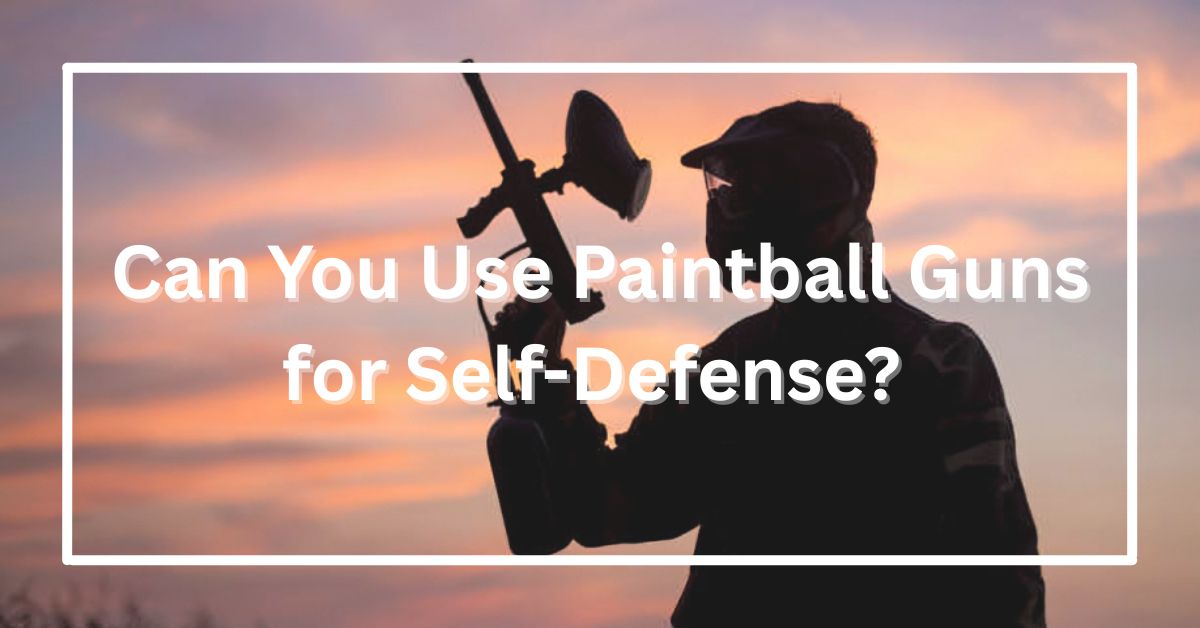For personal safety, a lot of people search for alternatives to traditional firearms. One question that usually comes up is whether paintball guns can be used for self-defense. Technically, the answer is yes. Should you, though? That’s a more complicated topic.
In this article, we’ll break down whether paintball guns can truly serve as a self-defense tool, what the law says, their pros and cons, and safer alternatives. If you’re considering using a paintball gun for protection, read this before making any decisions.
What is a Paintball Gun?
Paintball guns, also known as markers, are devices that shoot small, round capsules filled with paint. They’re mainly used in the sport of paintball, where players eliminate each other by marking their opponents with paint.
These guns typically use CO2 or compressed air to fire the paintballs at high speed—often up to 300 feet per second (fps).
While they’re designed for recreation, their power and design make people wonder: could this work in a self-defense scenario?
Can You Legally Use a Paintball Gun for Self-Defense?
U.S. Laws (and How They Vary)
In most parts of the United States, paintball guns are considered non-lethal weapons. However, using one for self-defense can fall into a gray area.
Here’s the key: you must prove that your response was reasonable and proportionate to the threat.
If you shoot someone with a paintball marker and it results in serious injury—or it’s deemed unnecessary by authorities—you could face legal consequences. This includes assault charges, property damage claims, or worse.
Other Countries
Laws vary significantly worldwide. In the UK, for instance, paintball guns are treated as air weapons. In countries like Australia and Canada, special permits may be required.
Always check your local laws before considering any kind of weapon—lethal or non-lethal—for self-defense.
Are Paintball Guns Effective for Self-Defense?
Paintball guns can definitely cause pain, confusion, and temporary distraction, but they come with serious limitations.
Pros:
- Non-lethal: You’re not likely to kill someone accidentally.
- Deterrent effect: The sound, size, and look of a paintball gun can intimidate an intruder.
- Affordable and accessible: Cheaper and easier to obtain than firearms in many areas.
Cons:
- Lack of stopping power: A determined attacker might push through the pain.
- Limited accuracy: Especially in high-stress situations.
- Reload time: Paintball guns are not the fastest to reload, making them impractical in fast-paced threats.
- Weather & environment sensitivity: CO2 systems can malfunction in extreme temperatures.
In other words, while a paintball gun might slow someone down, it probably won’t stop a serious threat.
The Rise of Pepper Ball Guns (A Better Alternative)
If you’re interested in paintball-style weapons for self-defense, you might want to look into pepper ball guns.
These are similar to paintball guns but instead shoot balls filled with pepper spray or other irritants. When they hit the attacker, they burst and release a cloud of irritant, causing coughing, temporary blindness, and panic.
Brands like Byrna and PepperBall have created non-lethal self-defense guns specifically designed for home and personal protection.
Benefits of Pepper Ball Guns:
- Greater stopping effect than paintballs
- Legal in many regions without requiring a firearms license
- Non-lethal but effective
- Looks intimidating, which may deter an attacker
Realistic Scenarios: Would a Paintball Gun Help?
Let’s look at a few practical situations:
1. A Home Intruder
You hear a noise at night and see someone breaking in. You grab your paintball gun and fire at the intruder. While they might be surprised and in pain, there’s no guarantee they’ll stop. In fact, if they’re armed or aggressive, this might escalate the situation.
2. Street Harassment
Someone follows you on a walk. If you happen to have a paintball gun in your bag (which is unlikely), pulling it out could scare them off. But again—if they’re not afraid or are armed, you may be in danger.
3. Animal Attacks
Some people use paintball guns to scare off aggressive dogs or wild animals. In these cases, paintballs might be effective as a deterrent.
Risks of Using Paintball Guns for Protection
1. Legal Repercussions
Firing a paintball gun at another person—even in self-defense—can be legally risky. If the situation doesn’t justify that level of force, you could be the one in trouble.
2. False Sense of Security
Because paintball guns look intimidating, people may rely too heavily on them. But they’re not designed to incapacitate.
3. Injury Liability
Paintballs can cause eye injuries, broken skin, or bruising. If the person you shoot decides to press charges or sue, you could be liable.
Better Self-Defense Options
If you’re serious about protecting yourself or your home, consider these alternatives:
- Pepper spray or gel: Legal in many places, easy to carry, and very effective.
- Stun guns or tasers: Provide real stopping power in a non-lethal way.
- Personal alarms: Loud enough to alert others and scare away attackers.
- Self-defense training: Your best weapon might be your awareness and preparation.
Conclusion
So, can you use a paintball gun for self-defense? You can—but it’s not ideal. For most people, it’s better to explore legal, effective, and safer self-defense tools. While paintball guns may look cool and feel empowering, they should stay on the battlefield, not your nightstand.

